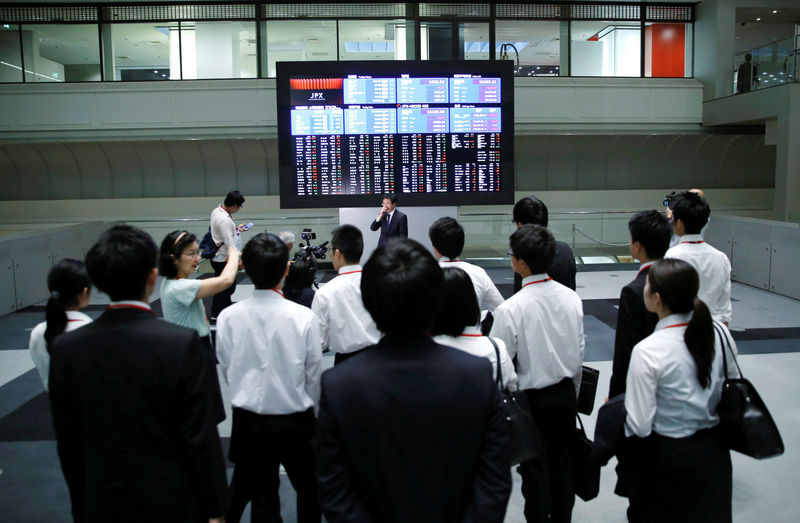By Wayne Cole
SYDNEY (Reuters) - Asian shares lost out to safe-harbour bonds on Wednesday as Sino-U.S. trade talks produced nothing but white noise, while concerns about a supply glut left oil prices nursing their biggest one-day loss in seven weeks.
Graphic: Asian stock markets - https://product.datastream.com/dscharting/gateway.aspx?guid=516bc8cb-b44e-4346-bce3-06590d8e396b&action=REFRESH
Figures from the American Petroleum Institute out late Tuesday showed a far larger rise in crude stocks than expected. That followed reports Russia was unlikely to deepen its cuts to crude output.
Brent crude (LCOc1) futures eased another 10 cents to $60.81 a barrel, after sliding 2.6% overnight, while U.S. crude (CLc1) dipped 2 cents to $55.19.
The mood in share markets was sombre with MSCI's broadest index of Asia-Pacific shares outside Japan (MIAPJ0000PUS) off 0.7%. Japan's Nikkei (N225) fell 0.8% and Shanghai blue chips (CSI300) 0.5%.
Australia's main index (AXJO) sank 1.3% led by the banks after the country's financial crime regulator alleged Westpac had breached laws on over 23 million instances and applied for civil penalties against the lender.
E-Mini futures for the S&P 500 (ESc1) shed 0.2% and EUROSTOXX 50 futures (STXEc1) 0.2%.
The prospects for progress on trade dimmed when China condemned a U.S. Senate measure on Hong Kong, vowing to take the steps necessary to safeguard its sovereignty and security.
The Senate unanimously passed legislation aimed at protecting human rights in Hong Kong.
Late Tuesday, U.S. President Donald Trump had threatened to raise tariffs further if China would not agree to a deal that he liked.
The aggressive tone unsettled Wall Street and the Dow (DJI) ended down 0.36%, while the S&P 500 (SPX) lost 0.06% and the Nasdaq (IXIC) added 0.24%.
Dour forecasts from retailers Home Depot (NYSE:HD) and Kohl's fuelled worries about consumer spending, while the energy sector (SPNY) was the S&P's biggest loser as oil slid.
COUNTING DOWN TO FED MINUTES
"The immediate focus remains on the U.S.-China trade talks, and markets seem reluctant to move much in either direction until they are resolved," wrote analysts at ANZ in a note.
"It was noticeable that fixed income markets rallied despite equity markets being stable, suggestive of a market that remains cautious about the growth outlook."
Yields on U.S. 10-year Treasuries (US10YT=RR) dropped further to a two-week trough of 1.75%, with a marked flattening of the curve hinting at a possible return of recession fears.
The dip in yields nudged the dollar down on the safe-haven Japanese yen and it was last at 108.47
The euro held at $1.1074 (EUR=) but faced chart resistance around $1.1090. The dollar was steadier on a basket of currencies at 97.886 (DXY).
Investors now await minutes of the Federal Reserve's last policy meeting where it cut interest rates and signalled a pause for the time being.
"The minutes will elaborate on the Fed's view that the downside risks to the U.S. economy have eased, and that a 'material reassessment' of the economic outlook will be needed for it to cut rates again," said Joseph Capurso, an analyst at Commonwealth Bank of Australia.
"We see the FOMC now on hold until March, 2020."
The market has all but given up on the prospect of an easing in December, which is now priced at just 0.8%. A move in March is put at a probability of around 42%.

The risk-off tone left spot gold a shade firmer at $1,474.30 per ounce